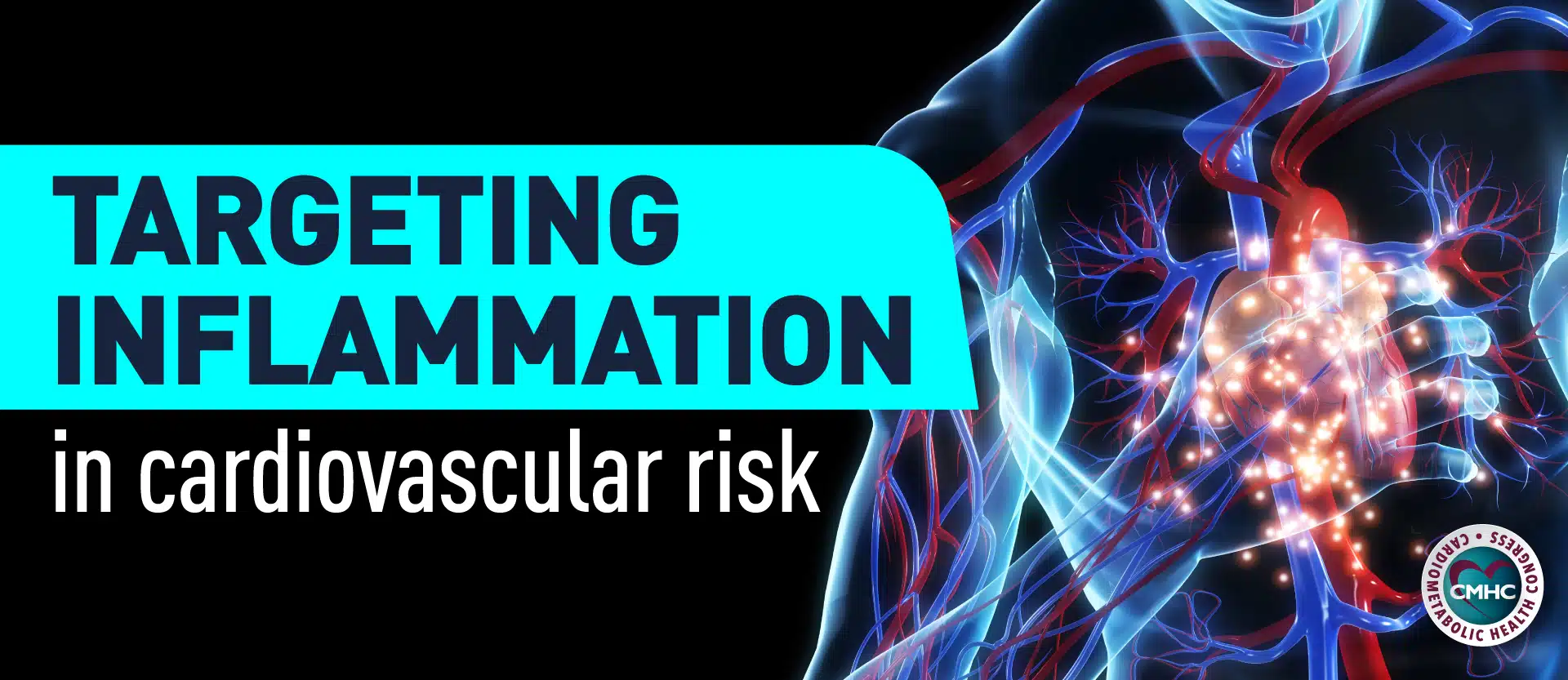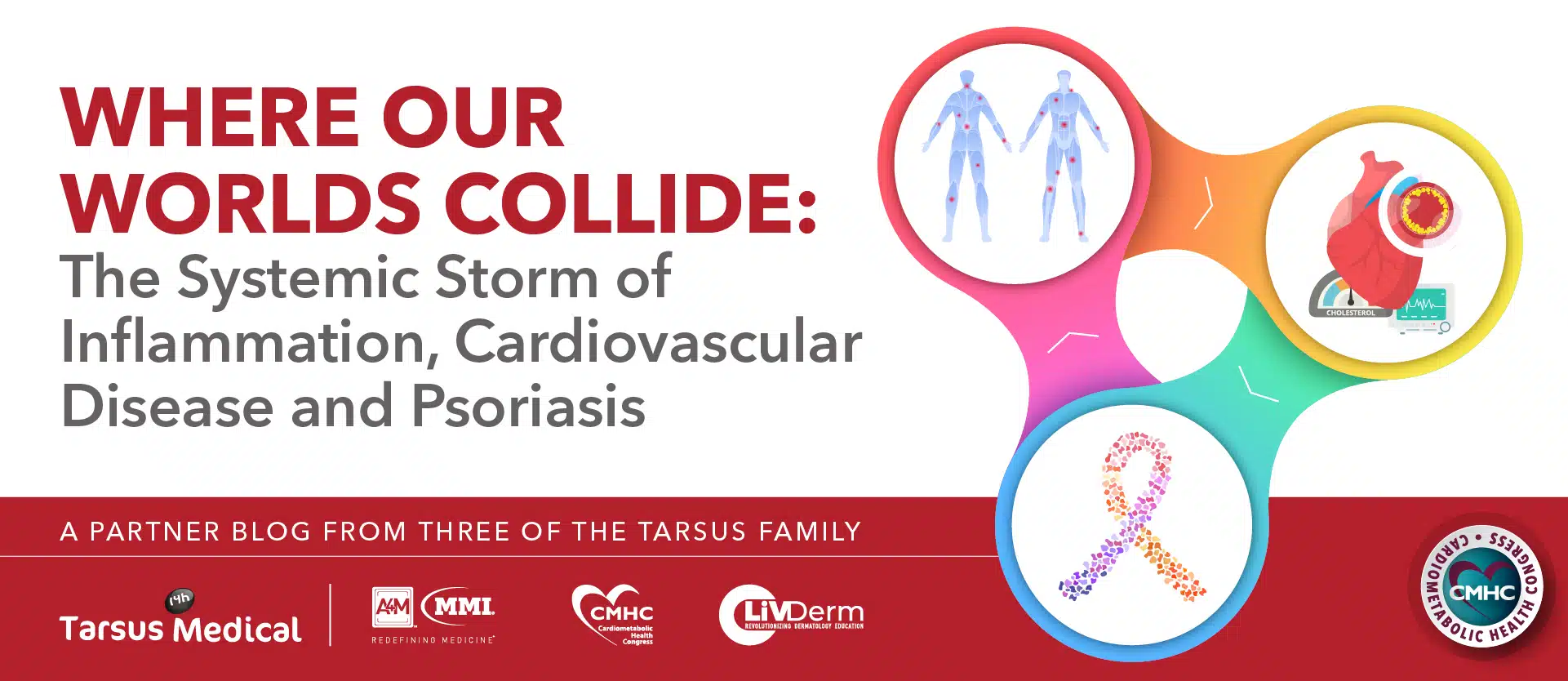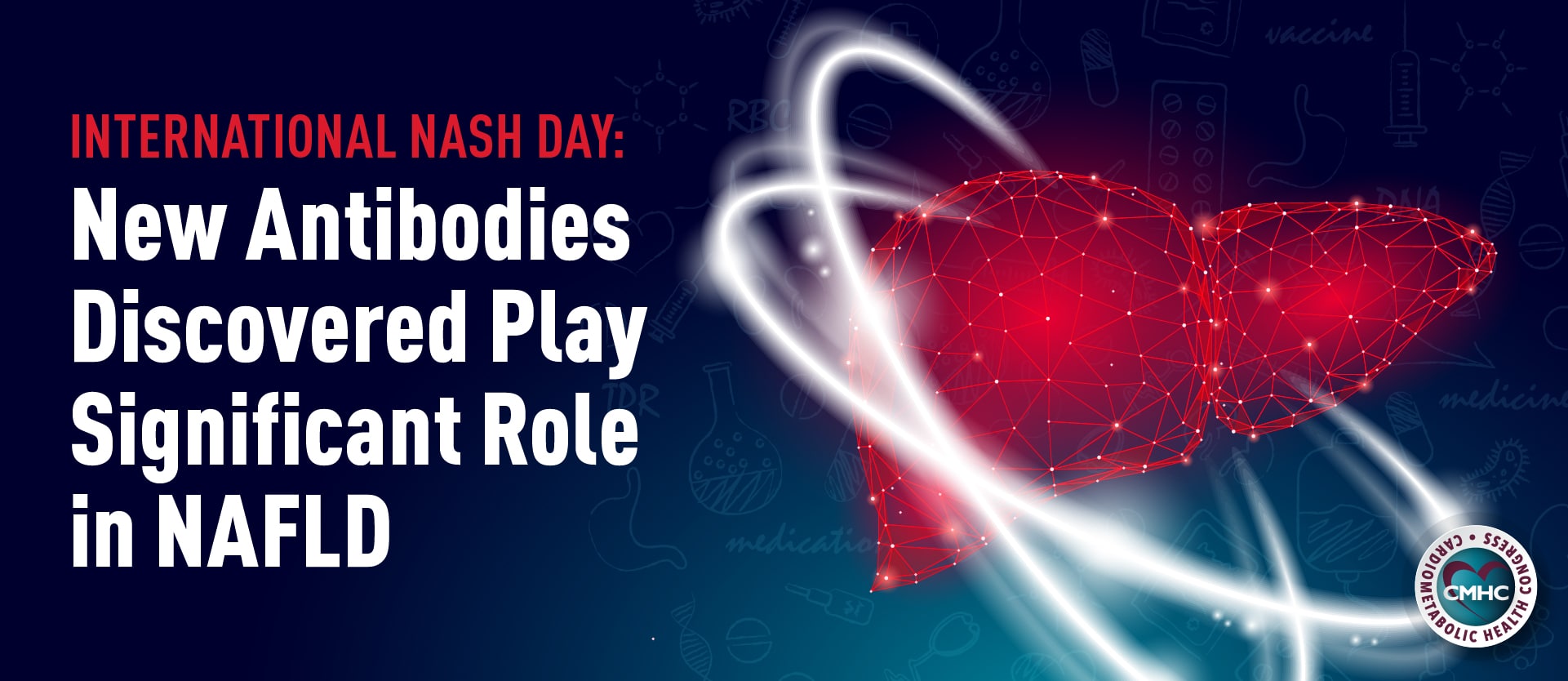The adverse effects of low-grade systemic inflammation are associated with the development of atherosclerosis, heart failure, obesity-related metabolic disorders, and chronic kidney disease. Because inflammation drives residual cardiovascular risk, Cardiometabolic Health Congress (CMHC) explores current and emerging anti-inflammatory agents in this setting.
Inflammation in Atherosclerosis
Atherosclerosis is no longer thought to be simply the result of lipids accumulating within the blood vessels. Researchers have demonstrated that systemic inflammation – even in otherwise healthy patients – is associated with increased CVD risk which begins with endothelial dysfunction. Eventually, pro-inflammatory cytokines, adhesion molecules and inflammatory cells enter the blood vessel wall along with low-density lipoprotein (LDL) molecules because of increased endothelial permeability. The LDL is then oxidized, followed by smooth cell proliferation and neovascularization, which ultimately cause the thickening of the blood vessel and plaque formation.
The role of inflammation in the development and progression of atherosclerosis informs potential treatment targets. While the anti-inflammatory therapy colchicine has shown promise in this setting, agents that target the pro-inflammatory cytokines interleukin-6 (IL-6) and interleukin-1β (IL-1β) are newer emerging targets. However, their mechanisms of action and clinical efficacies vary.
Elevated levels of IL-6 have been linked to an increased risk of cardiovascular disease, and it is thought that blocking the IL-6 pathway could have beneficial effects on the cardiovascular system. IL-6 receptor agonists such as tocilizumab and sarilumab block the IL-6 receptor, inhibiting its signaling pathway which can reduce inflammation and improve cardiovascular outcomes.
IL-1β acts as a potent mediator of inflammation by initiating and coordinating various inflammatory pathways. Therefore, targeting IL-1β or its receptors has become an important therapeutic strategy in managing certain inflammatory disorders. Monoclonal antibodies targeting IL-1β, such as canakinumab, are designed to neutralize IL-1β activity and reduce inflammation.
Canakinumab: Mechanism and Trials
Canakinumab is a monoclonal antibody designed to neutralize IL-1β activity and reduce inflammation. In the context of heart disease, canakinumab has been studied in individuals with a history of heart attack (myocardial infarction) and high levels of inflammation, as measured by C-reactive protein (CRP). While not currently approved to treat heart disease or lower cardiovascular risk, by inhibiting IL-1β, canakinumab reduces systemic inflammation which may contribute to the stabilization of atherosclerotic plaques in blood vessels and the prevention of subsequent cardiovascular events.
The CANTOS trial (2017)
The Canakinumab Anti-inflammatory Thrombosis Outcome Study (CANTOS) enrolled more than 10,000 patients with a history of myocardial infarction and elevated high-sensitivity CRP levels. Results showed that canakinumab reduced the risk of recurrent cardiovascular events, including myocardial infarction, stroke, and cardiovascular death, by 15% compared to placebo. The reduction in risk was more pronounced in patients who achieved the largest reductions in hs-CRP levels with canakinumab treatment. Interestingly, canakinumab treatment did not significantly affect lipid levels, suggesting that its benefits were due to its anti-inflammatory effects rather than its effects on cholesterol.
The CANTOS trial was significant because it demonstrated that targeting inflammation with an anti-inflammatory drug could reduce cardiovascular risk independent of traditional cardiovascular risk factors such as cholesterol levels. This finding has opened up new avenues for research into the role of inflammation in cardiovascular disease and the potential for anti-inflammatory therapies to prevent or treat cardiovascular disease.
Ziltivekimab: Mechanism and Trials
ziltivekimab (also known as emapticap pegol) is an IL-6 ligand trap. It binds to both soluble and membrane-bound IL-6 and prevents its interaction with the IL-6 receptor. By trapping IL-6, ziltivekimab inhibits its inflammatory effects and aims to reduce inflammation in various conditions. The human monoclonal antibody against IL-6, ziltivekimab, is currently being evaluated to see if reducing inflammation can reduce the risk of cardiovascular events in people with cardiovascular disease, chronic kidney disease and inflammation. Ziltivekimab has been studied in clinical trials for its potential therapeutic use in conditions like atherosclerosis and cardiovascular disease. By inhibiting IL-6, ziltivekimab aims to reduce inflammation and potentially improve outcomes in patients at high risk for cardiovascular events.
The RESCUE trial
Building on the observed effect of IL-1β inhibition markedly reducing vascular event rates among the subgroup with baseline CKD in the CANTOS trial, the phase 2 RESCUE trial addressed this issue with ziltivekimab, a fully human monoclonal antibody directed against the IL-6 ligand and that is being specifically developed for atherothrombotic disease. RESCUE focused on individuals with elevated levels of high-sensitivity CRP and chronic kidney disease (CKD), a group with substantial cardiovascular risk and unmet clinical need for whom alternative proven anti-inflammatory agents such as renally excreted colchicine are contraindicated. IL-6 levels are also a powerful predictor of incident vascular disease in the setting of CKD, more so in fact than LDL cholesterol. Thus, the magnitude of high-sensitivity CRP reduction in RESCUE was roughly twice as large as that achieved within CANTOS using an upstream IL-1β inhibitor. Moreover, compared to placebo, waterfall plots demonstrate highly efficient inhibition of IL-6 and subsequent hsCRP reductions with ziltivekimab for virtually all randomized participants.
Although the total sample size and duration of therapy in RESCUE were modest, the presented data have allowed ziltivekimab to be advanced into a formal long-term endpoint trial known as ZEUS.
Novo Nordisk Development executive vice-president Martin Holst Lange said: “We are very encouraged by these promising Phase II data, which is an important step towards a new potential anti-inflammatory treatment approach for people living with atherosclerotic CVD and CKD. Based on these results, we are planning to progress ziltivekimab to a large-scale Phase III cardiovascular outcomes trial to further assess its potential, as we continue to advance our commitment in cardiovascular disease.”
The ZEUS trial (2025)
With results expected by 2025, The Effects of Ziltivekimab Versus Placebo on Cardiovascular Outcomes in Participants With Established Atherosclerotic Cardiovascular Disease, Chronic Kidney Disease and Systemic Inflammation (ZEUS) trial enrolled 6200 patients with stages 3 and 4 CKD and elevated high-sensitivity CRP to test whether reducing circulating IL-6 reduces cardiovascular risk. The trials primary endpoint is a reduction in major adverse cardiovascular events (MACE) inclusive of myocardial infarction, stroke, and cardiovascular death. Given the emerging role of IL-6 in renal disease, an important secondary aim of ZEUS will address whether chronic IL-6 inhibition slows the progression of renal disease as documented by changes in glomerular filtration rate and the urinary to albumin creatinine ratio over time, as well as progression to Stage 5 CKD and dialysis. In addition, baseline measures of left ventricular ejection fraction will be obtained in ZEUS so that participants can further be stratified on the basis of heart failure with reduced or preserved ejection fraction.
Sarilumab: Mechanism and Trials
Sarilumab is another receptor antagonist of IL-6. It is a fully human monoclonal antibody against IL-6 successfully used to control symptoms in RA and other autoimmune and inflammatory conditions. By binding to the IL-6 receptor, sarilumab inhibits the signaling pathway, reducing excessive inflammation and providing relief from symptoms associated with inflammatory conditions.
The SARIL-RA-MI trial
The SARIL-RA-MI trial evaluated the effect of sarilumab on MACE in patients with rheumatoid arthritis who also had a history of myocardial infarction or other cardiovascular events. The trial found that sarilumab reduced the risk of MACE compared to placebo.
The LIMIT trial
In addition, the LIMT study evaluated the use of sarilumab in patients with COVID-19 and acute coronary syndrome and found that its use reduced the risk of recurrent cardiovascular events compared to placebo. Reductions in CRP and neutrophils were considered pharmacodynamic markers of systemic IL-6 signaling inhibition.
Key Takeaway
Research indicates that both IL-6 receptor agonists and interleukin-1β monoclonal antibodies have the potential to reduce cardiovascular disease by targeting inflammation. More research to determine the long-term efficacy, safety profiles, and optimal use in different patient populations is needed.
- Campbell, Paul. “A potential new role for colchicine: unraveling inflammation in ASCVD.” April 7, 2023. HCP Live. Available at https://www.hcplive.com/view/a-potential-new-role-for-colchicine-unraveling-inflammation-in-ascvd, accessed April 20, 2023.
- Deftereos, Spyridon G., et al. “Colchicine in cardiovascular disease: in-depth review.” Circulation 145.1 (2022): 61-78.
- Gabay C, Burmester GR, Strand V, Msihid J, Zilberstein M, Kimura T, van Hoogstraten H, Boklage SH, Sadeh J, Graham NMH, Boyapati A. Sarilumab and adalimumab differential effects on bone remodelling and cardiovascular risk biomarkers, and predictions of treatment outcomes. Arthritis Res Ther. 2020 Apr 7;22(1):70. doi: 10.1186/s13075-020-02163-6. PMID: 32264972; PMCID: PMC7137491.Grundy, Scott M., et al. “2018 AHA/ACC/AACVPR/AAPA/ABC/ACPM/ADA/AGS/APhA/ASPC/NLA/PCNA guideline on the management of blood cholesterol: a report of the American College of Cardiology/American Heart Association Task Force on Clinical Practice Guidelines.” Circulation 139.25 (2019): e1082-e1143.
- Giachi A, Cugno M, Gualtierotti R. Disease-modifying anti-rheumatic drugs improve the cardiovascular profile in patients with rheumatoid arthritis. Front Cardiovasc Med. 2022 Oct 24;9:1012661. doi: 10.3389/fcvm.2022.1012661. PMID: 36352850; PMCID: PMC9637771.
- Greco D, Gualtierotti R, Agosti P, Adorni MP, Ingegnoli F, Rota M, Bernini F, Meroni PL, Ronda N. Anti-atherogenic Modification of Serum Lipoprotein Function in Patients with Rheumatoid Arthritis after Tocilizumab Treatment, a Pilot Study. J Clin Med. 2020 Jul 8;9(7):2157. doi: 10.3390/jcm9072157. PMID: 32650513; PMCID: PMC7408911.
- Huizinga TW, Fleischmann RM, Jasson M, Radin AR, van Adelsberg J, Fiore S, Huang X, Yancopoulos GD, Stahl N, Genovese MC. Sarilumab, a fully human monoclonal antibody against IL-6Rα in patients with rheumatoid arthritis and an inadequate response to methotrexate: efficacy and safety results from the randomised SARIL-RA-MOBILITY Part A trial. Ann Rheum Dis. 2014 Sep;73(9):1626-34. doi: 10.1136/annrheumdis-2013-204405. Epub 2013 Dec 2. PMID: 24297381; PMCID: PMC4145418.
- Nidorf, Stefan M., et al. “Colchicine in patients with chronic coronary disease.” New England journal of medicine 383.19 (2020): 1838-1847.
- Nidorf, Stefan M., et al. “Low-dose colchicine for secondary prevention of cardiovascular disease.” Journal of the American College of Cardiology 61.4 (2013): 404-410.
- Ridker, Paul M. “Anticytokine agents: targeting interleukin signaling pathways for the treatment of atherothrombosis.” Circulation research 124.3 (2019): 437-450.
- Ridker PM. From RESCUE to ZEUS: will interleukin-6 inhibition with ziltivekimab prove effective for cardiovascular event reduction? Cardiovasc Res. 2021 Sep 28;117(11):e138-e140. doi: 10.1093/cvr/cvab231. PMID: 34352102; PMCID: PMC8861265.
- Shirazi, Lily F., et al. “Role of inflammation in heart failure.” Current atherosclerosis reports 19 (2017): 1-9.
- Tardif, Jean-Claude, et al. “Efficacy and safety of low-dose colchicine after myocardial infarction.” New England journal of medicine 381.26 (2019): 2497-2505.
- Visseren, Frank LJ, et al. “2021 ESC Guidelines on cardiovascular disease prevention in clinical practice: Developed by the Task Force for cardiovascular disease prevention in clinical practice with representatives of the European Society of Cardiology and 12 medical societies With the special contribution of the European Association of Preventive Cardiology (EAPC).” European journal of preventive cardiology 29.1 (2022): 5-115.

















